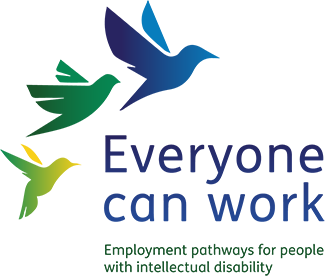Most people don’t stay in the same job all their lives. This is especially true for younger people as they work out what kind of work they prefer.
There are many different reasons for changing jobs. Sometimes you might find that:
- your job doesn’t suit you
- you want to try something new and different
- you want a job that pays more or helps you build a long-term career
- you want to work closer to home
- you want to run your own business.
Working in open employment leads to a better quality of life and wellbeing for people with intellectual disability. However, pathways into open employment have often been very limited. We’ve found that:
- most National Disability Insurance Scheme (NDIS) participants with intellectual disability work in an Australian Disability Enterprise (ADE) or go to day programs
- some people with intellectual disability get jobs in open employment, but don’t get enough ongoing support from their Disability Employment Services (DES) provider to do their jobs properly
- many people with higher employment support needs have only been able to get support from an ADE.
People with intellectual disability who want a different kind of job, to change workplaces, or to be self-employed, may need a lot of support. The good news is that you can now ask for this support in your NDIS plan. This includes higher-level ongoing support to work in open employment.
If you want to change jobs, you should write down your goals to take to your next NDIS planning meeting. A long-term goal could be to have a job in open employment. A short-term goal could be the next steps you need to take towards changing jobs.
You should think about:
- What kind of job do you want?
- Do you want on-the-job experience to try out different jobs?
- Do you want to do a training course?
- Do you need help to work out what you would like to do?
Then, you should ask the NDIS for the support you need to take the next steps.
If it’s a long time until the next scheduled NDIS meeting, you should ask the Local Area Coordinator (LAC) or Planner to apply for an unscheduled plan review, so you can add a goal about changing jobs. You may need to give them evidence that your circumstances have changed.
The important thing about using the NDIS for employment, is that the supports in the plan are designed just for you. You decide your employment goals and you are in charge of how you use the supports in your plan.
This includes choosing who provides your supports and what you get help with. You don’t have to fit into a program or share supports with other people.
You can find out more about getting ready for work in the ‘Let’s talk about work’ booklet on the NDIS website.
An Easy Read version of the booklet is also available (PDF).
Open employment is when people with and without disability work together in regular jobs.Read more The Australian Government-funded disability insurance scheme that funds supports for eligible people with disability.
Read more An Australian Disability Enterprises (ADE) is a type of employment support for people with disability who need significant support to work.
Read more Day programs provide activities for groups of people with disability. These activities can include recreation and developing general skills.
Read more Open employment is when people with and without disability work together in regular jobs.
Read more Disability Employment Services (DES) is the Australian Government’s employment service that can help people with disability find work and keep a job in open employment.
Read more Every National Disability Insurance Scheme (NDIS) participant has an individual plan that lists their goals and the amount of funding the National Disability Insurance Agency (NDIA) has approved.
Read more Local Area Coordinators (LACs) help people understand and access the National Disability Insurance Scheme (NDIS). They also work with NDIS participants to develop and use their NDIS plan.
Read more



